#islamic institute of knowledge
Text
An Imam speaking in Dearborn, Michigan, this month claimed that Zionists, people who support the Jewish state of Israel, are “savages” and are “barbaric.”
The Middle East Media Research Institute (MEMRI) translated the speech from Dr. Baqir Berry that was broadcast by the Islamic Institute of Knowledge.
“Zionism is the ISIS of today,” he claimed. “As there was an ISIS for the Muslims, there is also an ISIS for the Jews. The [Jewish] ISIS is a million times worse than the ISIS of the Muslims. We should know this. A million times [worse]. The members of ISIS did not commit the kind of crimes perpetrated by the Zionists.”
“Just wait a bit for the war to subside, and you will hear again the voices of all the idiots and fools in our world,” he continued. “What peace do you want to have with those [Israelis]? Us in America – what peace? Those Zionists everywhere, even here in America, are savages. They are barbaric everywhere. They feel no pangs of conscience over what is happening there. There is a group of Jews rebelled against this, but Zionist jews are criminals.”
The clip concluded with Berry saying: “This is the great and imminent danger that [threatens] all of humanity. Israel is a great imminent danger. Just like Nazism posed an imminent danger to all the surrounding countries, and just like the ISIS caliphate posed a great danger, everybody wanted to end the existence of the ISIS entity and the Nazi entity – you cannot remove this great [Israeli] danger unless you remove [the entity]. If you want a real democratic country, you need to reeducate the Jews … the Zionists, with a new culture of being open, seeing others as human beings, a culture of real peace and tolerance, rather than racism.”
#dr baqir berry#islamic institute of knowledge#dearborn#dearborn michigan#jews#antisemitism#zionism#isis
16 notes
·
View notes
Text
From Streamlining to Mainstreaming “Islamization of Knowledge”
Paper Title: From Streamlining to Mainstreaming “Islamization of Knowledge”
Author: Sari Hanafi
Publisher: American Journal of Islam and Society, 38(1-2), 101 -135.
International Islamic University of Malaysia (IIUM) was established according to the visions developed by prominent Islamic scholars Ismail al-Faruqi (Co-founder of the International Institute of Islamic Thought in…

View On WordPress
#Abdul Hamid Abu Sulayman#IIUI#International Institute of Islamic Thought#International Institute of Islamic Thought & Civilization#IoK Project#Islamic Economics#Islamic Research#Islamic Sciences#Islamic Studies#Islamization of Knowledge#Ismail al-Faruqi#Naqib Al Attas
1 note
·
View note
Text
Salman Rushdie has just published Knife: Meditations After an Attempted Murder. In August 2022, he was giving a talk at the Chautauqua Institution in New York. Hadi Matar, a 24-year-old from New Jersey, rushed the stage and stabbed him 15 times. It was astonishing that Salman survived. He lost the sight in one eye and sustained terrible injuries, but he’s still with us and he’s still writing, and unlike Hadi Matar, he’s still worth hearing.
We think of fanatics as stalkers with an obsessive knowledge of their targets. Like the antisemites who compile lists of Jews in the media or the homophobes who so focus on the details of gay sex they might almost be closet cases
Most terrorists and bigots are not like that. They are like soldiers in an army who kill and hate for no other reason than tradition or men in authority have told them to kill and hate. If we were less fascinated by the pseudo-glamour of violence, we would see them for what they are: dullards and jerks.
In Knife Salman is almost as angered by the sheer lazy stupidity of his wannabee assassin as his violence.
“I do not want to use his name in this account. My Assailant, my would-be Assassin, the Asinine man who made Assumptions about me, and with whom I had a near-lethal Assignation … I have found myself thinking of him, perhaps forgivably, as an Ass.”
The ass “didn’t bother to inform himself about the man he decided to kill. By his own admission he read barely two pages of my writing and watched a couple of YouTube videos”.
That was enough, apparently, along with a little light indoctrination in the Levant.
We know from Matar’s mother that her son changed from a popular young man to a moody religious zealot after visiting her ex-husband in the Hezbollah-controlled town of Yaroun in Lebanon, a mile or so from the Israeli border.
“I was expecting him to come back motivated, to complete school, to get his degree and a job. But instead, he locked himself in the basement. He had changed a lot. He didn't say anything to me or his sisters for months.”
Salman quotes a wonderfully perceptive line from Jodi Picoult
“If you meet a loner, no matter what they tell you, it’s not because they enjoy solitude. It’s because they have tried to blend into the world before, and people continue to disappoint them.”
Rushdie is openly contemptuous, as he has every right to be.
“I see you now at twenty-four,” he writes, “already disappointed by life, disappointed in your mother, your sisters, your father, your lack of boxing talent, your lack of any talent at all; disappointed in the bleak future you saw stretching ahead of you, for which you refused to blame yourself.”
This has always been the way. Readers old enough to remember 1989 when the Ayatollah Khomeini ordered Salman’s execution for writing a blasphemous satire of Islam’s origin story in the Satanic Verses,will know that Khomeini had not read it. Nor had the furious demonstrators in the streets or the regressive leftists and Tory ministers who upbraided him for the non-crime of causing offence.
Those of us who had read the book pointed out that it was a magical realist fiction which contained sympathetic accounts of the racism Muslim immigrants in the UK suffered. Indeed, the Tories of the day loathed Salman, we continued, because of his confrontations with official racism.
But after a while we fell silent. Pleading with his enemies felt demeaning. It gave them undeserved credit, as if they were reasonable people, who could be swayed by evidence rather than just, well, pillocks.
In Knife Salman attempts an imaginary conversation with his persecutor.
OK, he says, Islam, unlike Judaism and Christianity, holds that man is not made in God’s image. God has no human qualities, it says.
But isn’t language a human quality? To have language, God would have to have a mouth, a tongue, vocal cords and a voice, just like a man. The terrorist’s understanding is that God cannot be like a man, however. So, God could not have spoken to Gabriel in Arabic. Gabriel must have translated his message when he came to the prophet.
The angel made it comprehensible to Muhammed by delivering it in human speech which is not the speech of God.
Thus, the version of Islamic instruction Matar received in his basement when he switched from playing video games to listening to Imams was an interpretation of a translation.
“I’m trying to suggest to you that, even according to your own tradition, there is uncertainty. Some of your own early philosophers have suggested this. They say everything can be interpreted, even the Book. It can be interpreted according to the times in which the interpreter lives. Literalism is a mistake.”
For a while, Rushdie says he wants to meet Matar again at the trial, as if he wants to have the argument in the flesh.
He tells a story about Samuel Beckett, which could only have happened to Samuel Beckett.
Beckett was walking through Paris in 1938 when he was confronted by a pimp named Prudent, who wanted money from him. Beckett pushed Prudent away, whereupon the pimp pulled out a knife and stabbed him in the chest, narrowly missing the left lung and the heart.
Beckett was taken to the nearest hospital, bleeding heavily. He only just survived.
You will never guess who paid for his treatment. James Joyce, of course, he did.
Anyway, Beckett went to the pimp’s trial. He met Prudent in the courtroom, and asked him why he had done it. This was the pimp’s reply: “Je ne sais pas, monsieur. Je m’excuse.” (I don’t know, sir. I’m sorry.)
But the more he thought about it, the less Rushdie had to say to his enemy. The idea that you can have theological arguments with a man who wants to kill you for writing a book he hasn’t even read felt ridiculous.
Although popular culture is full of stories about murderers, and true crime podcasts top the charts, killers and fanatics are nearly always less interesting than their victims. More often than not they are just thick. Nasty and vicious, but thick first of all.
We are about to see the stupidity of fanatics deployed on a mass scale. Two thirds of Republican voters (and nearly 3 in 10 Americans) continue to believe that the 2020 election was stolen from Donald Trump, and that Joe Biden was not lawfully elected. They think it because that is what Trump told them to think.
Islamists told Matar that Salman was an apostate, and that was all he needed to know. Trump told Republicans the election was stolen and ditto.
If Republicans were consistent people, they would not vote for Trump in 2024. What would be the point? They would have every reason to fear that the deep state would rig the 2024 presidential election as it rigged the 2020 presidential election.
But they will vote for him because, once again, that is what he tells them to do.
In the end there is a limit to how much attention you can pay the vicious and the stupid.
They are not interesting enough, as Rushdie concluded with marvellous disdain as he contemplated the life sentence Matar will face.
"Here we stand: the man who failed to kill an unarmed seventy-five-year-old writer, and the now 76-year-old writer. Somewhat to my surprise, I find I have very little to say to you. Our lives touched each other for an instant and then separated. Mine has improved since that day, while yours has deteriorated. You made a bad gamble and lost. I was the one with the luck… Perhaps, in the incarcerated decades that stretch out before you, you will learn introspection, and come to understand that you did something wrong. But you know what? I don’t care. This, I think, is what I have come to this courtroom to say to you. I don’t care about you, or the ideology that you claim to represent, and which you represent so poorly. I have my life, and my work, and there are people who love me. I care about those things.”
207 notes
·
View notes
Text
Muslim Clothing Resource
hello everyone! i put together a quick resource post for some basic Muslim clothing laws and modest outfit references. all the information is below the cut. bear in mind, i am not Muslim, so this is all based on my own research and personal knowledge. if anything seems inaccurate, please let me know so i can edit and provide more accurate information. if you have more ideas for places to find outfit inspo, please relblog or send it to my inbox or DMs! may the force be with you!
Muslim clothing law (summarized from alislam.org)
scholars state that in accordance with the Holy Qur’an, women should cover all but their hands and face when among men who are not close relatives
Among immediate family (father, uncles, brothers, grandfathers, young children)
anyone regarded as Mahram
Mahram–anyone it is haram (forbidden by Islamic Law) to marry
Clothing inspo
Islamic Fashion Institute, website and instagram
modest fashion inspo interest board
Tips
Layer clothing
Long skirts / dresses
Loose / flowing pants
Look at different styles of hijab for reference
Include accessories and jewelry
66 notes
·
View notes
Text
Annihilation of education: 100 European academics sign Euro-Med Monitor petition against systematic Israeli destruction of Gaza Strip’s educational system
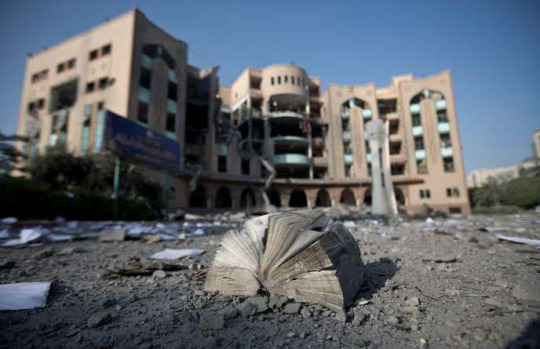
Occupied Palestinian Territory - About a hundred leading European academics have condemned Israel’s genocide against Palestinian civilians in the Gaza Strip, ongoing since 7 October 2023, and its physical and cultural liquidation of them. including the systematic destruction of the educational system in the Gaza Strip.
In a Euro-Med Human Rights Monitor petition titled “Annihilation of Gaza Education: Israel is systematically erasing the entire educational system”, the academics decry Israel’s physical and cultural liquidation of Palestinian civilians in the Strip and express deep concern about the Israeli army’s continued targeting of academics, educational institutions, and cultural heritage sites there.
The scholars point to knowledge and education as fundamental to human civilisation worldwide, but emphasise that for an occupied people like the Palestinians, education plays a distinctly vital role in society. Education preserves hope and freedom against oppressive, apartheid-era, and depressing policies, plus fosters culture and is essential to the achievement of both individual and societal prosperity.
The current Israeli military assaults on the Gaza Strip have caused the entire educational process there to be completely disrupted, assert the scholars. The petition warns of grave long-term ramifications due to the bombing of homes of academic, scientific, and intellectual figures without prior notice, which has already led to the killing of hundreds of teachers and thousands of students. The academics also cite estimates from the International Monetary Fund that 70% of the Strip’s colleges and universities have been destroyed, costing the education sector $720 million.
Israeli military attacks have entirely or partially destroyed six universities in the Gaza Strip: Islamic University, Al-Israa University, Rabat University, Al-Azhar University, Al-Aqsa University, and Al-Quds Open University.
The academics state that on 11 October 2023, Israeli airstrikes completely destroyed the Islamic University in Gaza City—one of the oldest institutions of higher education in the besieged Strip—in violation of the rules of international humanitarian law. These rules prohibit deliberate attacks against civilians and require the distinguishing of civilian objects from military objectives; they also call for special protection for educational and cultural institutions.
Al-Israa University was completely destroyed after the Israeli army blew up all its buildings and facilities on 17 January 2024. Before attacking the school, Israel had turned it into military barracks and then used it as a temporary detention centre. The destruction included the National Museum, which housed over 3,000 rare antiquities under licence from the Palestinian Ministry of Antiquities. The university’s administration affirmed in an official statement that the antiquities are believed to have been stolen by the Israeli army.
Additionally, three university presidents have been killed in the Israeli attacks, along with more than 95 university deans and professors; 68 of whom held professor’s degrees. Meanwhile, 88,000 students have been deprived of receiving their university education, and 555 students were not granted the international scholarships they were offered prior to the genocide.
According to the Palestinian Ministry of Education, 4,327 students have been killed and 7,819 others have been injured during the ongoing attacks, while 231 teachers and administrators have been killed and 756 injured.
The Israeli military actions may amount to premeditated killing and destruction, i.e. an attempt to kill and silence scholars involved in the Palestinian education system, which would have a massive impact on Palestinian future generations. The petition states that attacks by Israeli forces on civilian objects, particularly those classified as historical or cultural monuments protected by special laws, not only constitute a grave breach of international humanitarian law and a war crime under the Rome Statute of the International Criminal Court, but also fall under the purview of genocide.
Signatories to the Euro-Med Monitor petition urge academics, scholars, and higher education institutions worldwide to vehemently denounce Israel’s unlawful killing of Palestinian academics and its systematic destruction of Palestinian cultural and historical assets in the Gaza Strip, such as schools, universities, libraries, and archives. The academics call for the international community to shed light on this specific example of Israel’s crime of genocide, which aims to physically and culturally destroy the Palestinian people as a whole and render the Gaza Strip uninhabitable, in order to force them to relocate.
The petition demands a boycott of Israeli academic institutions that support the occupation of Palestinian lands, especially those situated inside illegal Israeli settlements and in the Occupied Palestinian Territory. These establishments normalise apartheid policies against the Palestinian people, gradual ethnic cleansing, and occupation, contend the academics.
In the same vein, over 180 British academics recently signed a separate petition denouncing the effects of the ongoing Israeli military assaults on Gaza Strip educational institutions as well as the targeting of professors, researchers, and students.
Both petitions stress that these Israeli military attacks against educational institutions in the Gaza Strip represent a clear violation of international humanitarian law, and, in addition, express solidarity with the people of Gaza, particularly students and researchers, in light of the targeting of their basic rights to survival.
Source - https://euromedmonitor.org/en/article/6220/Annihilation-of-education:-100-European-academics-sign-Euro-Med-Monitor-petition-against-systematic-Israeli-destruction-of-Gaza-Strip’s-educational-system
#free Palestine#free gaza#I stand with Palestine#Gaza#Palestine#Israel is committing genocide#Israel is committing war crimes#Israel is a terrorist state#Israel is a war criminal#Israel is an apartheid state#Israel is evil#Israeli war crimes#Israeli terrorism#IOF Terrorism#Gazaunderattack#Palestinian Genocide#Gaza Genocide#end the occupation#Israel is an illegal occupier#Boycott Israel#gaza strip
20 notes
·
View notes
Text
"Make no mistake: There is an ideological witch hunt happening on college campuses right now, the likes of which has not been seen since Senator Joseph McCarthy and the House Un- American Activities Committee tried to ruin people’s reputations in the middle of the last century. Students and professors are being targeted by university administrators, assaulted by police, and investigated for their politics by Congress.
And yet, it is only the second worst thing happening to college students and professors right now. ...
in their book Manufacturing Consent: The Political Economy of Mass Media, Noam Chomsky and Edward Herman described the kinds of things which have been happening to professors like me as the fourth filter of their “propaganda model,” where flak or enforcers beat people up in the town square (verbally, politically, or even physically). The point of these spectacular floggings? When academics or journalists are seen being punished publicly, others are meant to get the message that they should keep quiet—or else.
One of the most violent forms of university flak has been the withholding of degrees, when students have worked towards diplomas for many years and have them stolen for engaging in moral disobedience about genocide. As postcolonial scholar Priyamvada Gopal observed, when university trustees have done this, it is “immoral blackmail, as is overruling faculty on this matter.”
Jairo Fúnez-Flores, an Assistant Professor of Curriculum Studies and Teacher Education in the Department of Curriculum and Instruction at Texas Tech University, was suspended for 40 days for his outspoken Palestinian support before being reinstated. Sami Schalk, author of the book Black Disability Politics, was hospitalized after being brutally attacked by police at the University of Wisconsin-Madison while trying to protect her students. Cops even broke a hand and nine ribs of Southern University of Illinois Edwardsville professor Steve Tamari while he was peacefully protesting at Washington University in St. Louis, Missouri. And Mohamed Abdou, a visiting professor at Columbia University, was inhumanely alerted he was being fired when president Minouche Shafik threw him under the bus on live TV during a congressional hearing; he received no due process and is being forced to leave the United States.
And still, as horrible as this has been for all of us in America, what we are encountering is not the worst thing happening to professors right now.
Far from it. Our Palestinian colleagues have been experiencing far worse.
At least 95 university professors have been killed in Gaza since the genocide began, according to the United Nations.
The UN reports that “more than 80 percent of schools in Gaza” have been “damaged or destroyed,” while the ICJ bluntly says that “Israel has targeted everyone one of Gaza’s universities, “including the Islamic University of Gaza, the oldest higher education institution in the territory, which has trained generations of doctors and engineers, amongst others—destroying campuses for education of future generations of Palestinians in Gaza.”
The UN uses a single, powerful word to describe what is happening to educators and education institutions in Palestine: scholasticide, the willful destruction of a society’s ability to produce knowledge and educate its people. Preventing a population from being able to do research and to teach its citizens literacy, agriculture, medicine, science and culture is an aspect of genocide is to take away the very means of life.
#McCarthyism#scholasticide#palestine#free palestine#gaza#isreal#genocide#colonization#apartheid#american imperialism#us politics#police state#solidarity encampments#gaza solidarity encampment#solidarity#settler police#settler colonialism#settler violence
12 notes
·
View notes
Text

War on Palestinian memory.
In 1948, Zionist militias stole book collections from homes as they ethnically cleansed Palestinians to establish the state of Israel. Those stolen books remain in the National Library of Israel to this day.
In 1982, just one day before the Sabra and Shatila massacre, Israeli forces looted the Palestine Research Center in Beirut and stole their collections.
Ten years before that, in 1972, the Mossad attempted to kill its second director, Anis Sayigh, with a letter bomb. Sayigh lost some of his fingers, and endured damage to his hearing and vision for the rest of his life.
In 1983, a car bomb targeted the center. It killed 14 people including Hanneh Shaheen, an economics researcher and the wife of the center’s third director, Sabri Jiryis.
In 2014, Israel bombed the Islamic University of Gaza. A student went to check the wreckage and found books under the rubble. He found a literature anthology in the bombed English department. It inspired him to establish the Edward Said Library in Beit Lahiya in 2017. In 2019, they opened a second branch in Gaza City. This student was Mosab Abu Toha, a celebrated Palestinian poet who was kidnapped last month by Israeli soldiers (he has since been released). The fate of the libraries in this current war is unknown, but we do know that Beit Lahiya has been flattened and Gaza City’s landscape has become unrecognizable.
The fate of other institutions during this war is known. The Gaza Municipal Library, as well as the Rashad Al-Shawa Cultural Center and its Diana Tamari Sabbagh Library, have all been destroyed by Israel.
This attack on the Gaza municipality central archive is a devastating chapter in the story of a long war on Palestinian memory, archives, testimony, knowledge, expertise, culture, and education.
We will rebuild and continue to write our history. We always have.
24 notes
·
View notes
Text
NURISTAN: SHEDDING LIGHT ON AN INACCESSIBLE CRAFT
HIDDEN IN THE EASTERN MOUNTAINS OF AFGHANISTAN, NURISTANI WOODCARVERS HAVE PERFECTED THEIR CRAFT OVER THE PAST THOUSAND YEARS, ADORNING HOUSES AND MOSQUES WITH CAREFULLY CARVED PATTERNS WHICH MEANINGS HAVE NOW MOSTLY BEEN LOST
Embedded in Afghanistan’s eastern mountains, the region of Kafiristan (“Land of the Infidels”) was long an isolated society. Cut off from the world courtesy of their deep mountain gorges and fierce warriors, their local religion was supplanted by Islam at the end of the 19th century ( renamed ‘Nuristan’, or “Land of Light”), over a millennium after the neighbouring regions. Their unique style of woodcarving, a centuries-old, integral component of their culture, is in dire need of safeguarding lest it be lost forever.
In its efforts to preserve Afghanistan’s intangible cultural heritage, Turquoise Mountain is being supported by the British Council’s Cultural Protection Fund to document and support Afghan crafts such as Nuristani woodcarving. In accordance with the guidelines set out by UNESCO’s 2003 Convention for the Safeguarding of Intangible Cultural Heritage, there is a pressing need to carry out background research on the craft prior to the more detailed inventory, systematically exploring Nuristan’s woodcarving history, symbolism and social meaning in collaboration with the National Archives of Afghanistan, the Afghanistan Centre at Kabul University, and other cultural institutions.
Woodcarving played an integral role in the delineation of Nuristan’s strictly hierarchical, class-based society. The producers of the craft came from the ‘Bari’, a class of people not regarded as members of society. As well as being woodworkers, the ‘Bari’ were more generally labourers, involved in building bridges and water mills, or acting as stone carvers and potters. Deemed to be impure and racially separate from the rest of society, the ‘Bari’ were, prior to the region’s Islamization, treated as slaves. As a result there is no genealogical record of the exceptionally skilled woodcarvers who transmitted the knowledge from master (ustad) to student (shagerd), generation after generation.

In the past Nuristani woodcarving held significant symbolic meaning and essentially acted as a tool of social signaling to identify acts of greatness, specifically hunting and feast-giving. The ‘Atrozhen’, or class of freemen, who made up about 90% of society, were allowed to decorate - or, rather, have the lower class ‘Bari’ decorate - their houses with the symbols. However, within the ‘Atrozhen’ the privilege was tightly controlled. A community council of Big Men effectively held the exclusive privilege of controlling social movement. The social positions and titles that people were given were obtained only upon this council’s approval.
Read More
9 notes
·
View notes
Text
Science is a rigorous, systematic endeavor that builds and organizes knowledge in the form of testable explanations and predictions about the world.[1][2] Modern science is typically divided into three major branches:[3] the natural sciences (e.g., physics, chemistry, and biology), which study the physical world; the social sciences (e.g., economics, psychology, and sociology), which study individuals and societies;[4][5] and the formal sciences (e.g., logic, mathematics, and theoretical computer science), which study formal systems, governed by axioms and rules.[6][7] There is disagreement whether the formal sciences are science disciplines,[8][9][10] because they do not rely on empirical evidence.[11][9] Applied sciences are disciplines that use scientific knowledge for practical purposes, such as in engineering and medicine.[12][13][14]
The history of science spans the majority of the historical record, with the earliest written records of identifiable predecessors to modern science dating to Bronze Age Egypt and Mesopotamia from around 3000 to 1200 BCE. Their contributions to mathematics, astronomy, and medicine entered and shaped the Greek natural philosophy of classical antiquity, whereby formal attempts were made to provide explanations of events in the physical world based on natural causes, while further advancements, including the introduction of the Hindu–Arabic numeral system, were made during the Golden Age of India.[15]: 12 [16][17][18] Scientific research deteriorated in these regions after the fall of the Western Roman Empire during the early middle ages (400 to 1000 CE), but in the Medieval renaissances (Carolingian Renaissance, Ottonian Renaissance and the Renaissance of the 12th century) scholarship flourished again. Some Greek manuscripts lost in Western Europe were preserved and expanded upon in the Middle East during the Islamic Golden Age[19] and later by the efforts of Byzantine Greek scholars who brought Greek manuscripts from the dying Byzantine Empire to Western Europe in the Renaissance.
The recovery and assimilation of Greek works and Islamic inquiries into Western Europe from the 10th to 13th century revived "natural philosophy",[20][21][22] which was later transformed by the Scientific Revolution that began in the 16th century[23] as new ideas and discoveries departed from previous Greek conceptions and traditions.[24][25] The scientific method soon played a greater role in knowledge creation and it was not until the 19th century that many of the institutional and professional features of science began to take shape,[26][27] along with the changing of "natural philosophy" to "natural science".[28]
New knowledge in science is advanced by research from scientists who are motivated by curiosity about the world and a desire to solve problems.[29][30] Contemporary scientific research is highly collaborative and is usually done by teams in academic and research institutions,[31] government agencies, and companies.[32][33] The practical impact of their work has led to the emergence of science policies that seek to influence the scientific enterprise by prioritizing the ethical and moral development of commercial products, armaments, health care, public infrastructure, and environmental protection.
12 notes
·
View notes
Note
I’m with brosef; I also didn’t think there were so many Nazis. Didn’t realize that all the far lefts screaming about Nazis being everywhere was actually about them. They were trying to let us know.
more likely they were trying to distract everyone, misdirection by pointing at a pastor that just wants to speak to his flock not over the internet, or truckers that would like to not be forced to take a vaccine without any knowledge of long term effects, or a veteran who would like to show that they love the country they served by placing flags around their yard, or a group of restaurant patrons that show their patriotism by standing up and joining in with the national anthem, or people that would like to speak about the great things about living in a nation where they're allowed to openly dissent and speak their minds without also condemning some injustice
And on and on.

___________________________-
Those of us that remember 9/11 and the days and weeks after will likely recall a strong level of patriotism and unity and all that good stuff, as a nation we were in shock.
On top of that there was a very loud minority of people that decided that every single person that looked vaguely middle eastern was involved and needed to be punished and a lot of animosity was brought on to not only the Islamic community (who were the intended targets) but also the Sikh and Hindu community because like most racists they were pretty damn ignorant.
It's a stain on our country that that happened, and is still happening occasionally.
I don't remember any significant amount of sanctioned protests calling for the destruction of an entire country and people when that was all going down, note significant because yes it did happen but nothing like what we're getting now with academics and institutes of higher education joining the fray on the side of genocide instead of reason.
This is a headline from yesterday I held on to
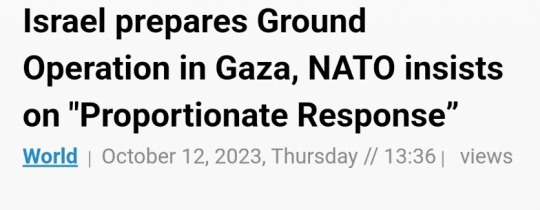
wonder if NATO knows what a proportionate response is and that in this instance it would involve the the intentional murder of hundreds of civilians, proportional would not include giving northern gaza 24 hours to get the civilians out before sending people in, that's going to cost the IDF in lives because it's also 24 hours for booby traps, snipers nests, and various other defensive devices and fortifications to be put together
That's what they've done on top of everything else over the decades to try and minimize civilian death hamass could keep it from happening too, if they wanted the people of gaza to be safe they could surrender, but they likely won't.
And the people on the left and the right that hate Jewish people will firmly place all of the blame on Israel and the Jewish people in general, because the had the audacity to be there first and somehow build all their holy sites right underneath the Islamic ones.
34 notes
·
View notes
Text
Women Scholars in Islam
A couple of months ago when I was distributing away books in Indonesia on behalf of my University, I got to meet some amazing people and teachers and exchange some thoughts and words. One of the teachers I met was Ustadh al Baidawi who teaches at an institution where they've both male and female students. I asked him if the boys study well or the girls. He began laughing and said, “Of course it's the girls!!”
We bought laughed in mutual agreement because that's one undeniable truth.
It's our society where for some reasons we've have come to believe that only men can become learned scholars of this Ummah.
There can be and have been Women Scholars in Islam. In fact the women went an extra mile in not just becoming great scholars themselves but they went on to give birth to, groom, nurture and guide the lil kids who became amongst the greatest scholars of Islam.
The story and legacy of Imam Ash Shafiee might be known to us but how many are aware that it was his mother who prepared him to travel to Madinah to meet Imam Malik and seek knowledge from him. She taught him the basics incase Imam Malik questions him, he should be able to reply. Imam Malik was known for his rigid nature and Ash Shafiee was a lil boy. He didn't accept Ash Shafiee as a student at first but when he tested Ash Shafiee, he accepted him and would make Ash Shafiee sit close to him. This was the wonder of the mother of Idris Ash Shafiee that turned him into whom the world remembers as 'Imam Ash Shafiee'.
The story and legacy of Imam al Bukhari might be known to us but how many are aware of his mother's tireless efforts and sleepless nights to groom her son Ismaeel al Bukhari into Imam al Bukhari whom the Ummah refers to as 'The leader of the believers in Hadith'.
The story of Imam Ahmed bin Hanbal and his legacy might be known to us but how many are aware of his mother who'd wake up in the cold chilling nights to warm up the water for Ahmed so that he does Wudhu for Fajr and sit in the gatherings of his teachers and turn into whom the world shall remember as 'Imam Ahmed bin Hanbal' who stood in the face of the tyrants all alone so that Islam wouldn't be altered.
The legacy of Sufyan ath Thawree might be known to those who are fond of reading Ahadith but how many are aware that it was his mother who encouraged him to gain knowledge by saying, “My beloved son! Focus on learning knowledge for I shall support you by weaving clothes.” Today Imam Sufyan ath Thawree is considered amongst the most authentic scholars of Hadeeth.
Sheikh Khalid Abdus Salam Shurfi.
For More, Join Sheikh Khalid's Circles:
40 notes
·
View notes
Note
Hi! I saw your Bible post and if you're interested in doing this, I have a few things you could look into/do which might make the process easier if you have trauma/want to approach it like a set of myths/historical document! I studied theology and religion at uni (particularly queer and eco theology) and came at it from a non-christian angle. Anyway feel free to delete this ask if it's not useful/too much etc. I just thought I'd give some ideas!
Yale has a series of online free lectures on the Old Testament which are super interesting and don't assume any faith! They go into the various myths which inspired the various stories in the bible (such as the flood), and the history of particular parts of the old testament library (they also have one for the new testament but I haven't watched it so don't know how good it is)
Look into apocrypha! The Nag Hammai scriptures, the gospel of Judas etc. Might actually be super interesting to you if you like the myth/history aspect! They're the books which were de-classified as canon (or never were canon), but all were written super early (2nd century) I specifically recommend the Gospel of Mary Magdalene and the Gospel of Judas. "Lost scriptures" by Ehrman is a great laymans book explaining the histories/controversies around this and even goes into the controversies surrounding the secret gospel of Mark aka the gospel where Jesus seems to have gay sex. (Ehrman writes a lot of good layman books on the bible which might be worth looking at!)
If you're looking at the NT maybe look at books like Jesus the Jew by Geza Vermes or The Crucified God by moltmamn. They're a bit specialised but it is SUPER important to modern historical studies of jesus to situate him as a Jew because that is who he was! Also Moltmamns book is v leftist and not fundamentalist.
"And man created God" by Selina O'Grady goes into detail about all the OTHER religions around during the 1st century (emperor cults etc.) Which is great for context for the gospels and also learning about cool religious traditions around in the 1st century!
Queer theology? Maybe? Might be fun for ya? Queer readings of the Bible are abundant from Ruth, Judas, David and Jonathan and jesus and there's quite a few books on them (I'm not dropping any here because I've read some Intense Theological Ones which Im not sure would appeal but if you Google you will find)
Look into Song of Songs the Official Sex is Good and Holy Book in the bible! (It's also just beautifully written)
Looking at things like "the Muslim Jesus" might also be interesting? Little collections of how Islam has viewed/interpreted Judaism and Christianity and why is always interesting and often another angle on those myths/historical documents
I'm sure other people could give you more ideas/ways to approach! I approached from a non religious angle but my institution was firmly situated in the Christian tradition so is slightly biased that way. But anyway! I just thought I'd give some starting points you could look at on the myth/history angle?
Have a lovely day!
I AM LOOKING??!!?? gd this is EXACTLY what I didn’t know I needed, all of this sounds very up my alley & like it’ll be great for what I’d be trying to get out of it. like. I have gone from “this is a thing I’ve been idly thinking about” to “this is a thing I could reasonably do and where I could start”!
I’ve done a little bit of looking into queer readings of things in the past (particularly david & jonathan) but then I had a years-long period that I technically still haven’t gotten out of where I physically could not bring myself to open a bible so I haven’t tried to actually read those stories myself while keeping a queer perspective in mind. also have had more years of lit classes that I dropped out of halfway through the semester so I have slightly more knowledge of how to dissect and analyze Texts than I used to
#everything I ever learned about the bible was in *deeply* religious environments#95% of which were evangelical fundamentalism#I did also go to an episcopal church about a dozen times when I lived in [redacted]#& i’ve been to mass a few times + had One catholic friend growing up#anon#answered#save#I literally feel like i’ve been given a gift lol
46 notes
·
View notes
Text
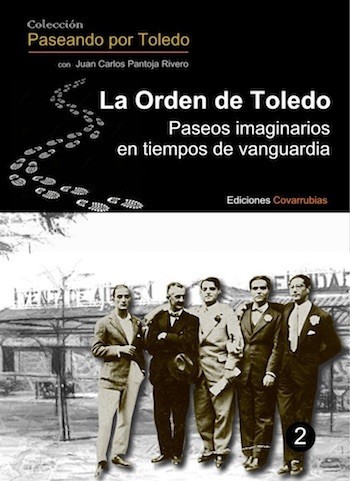
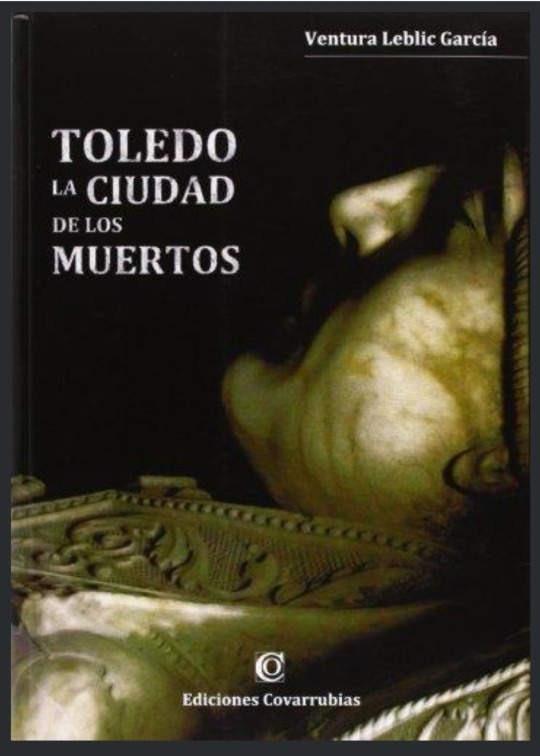
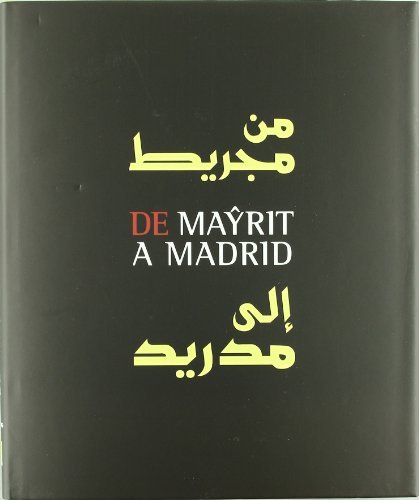
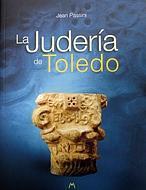
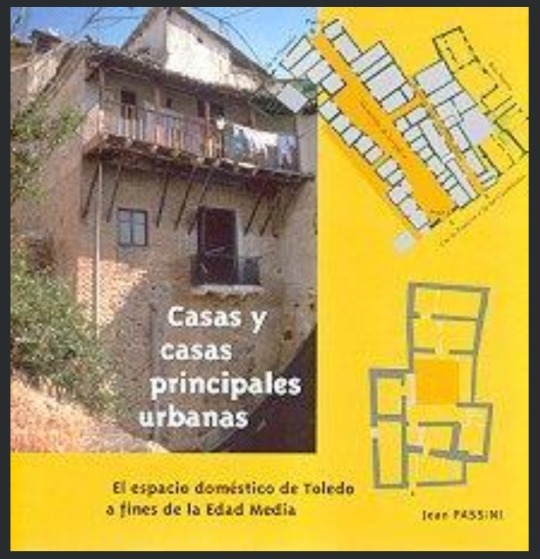
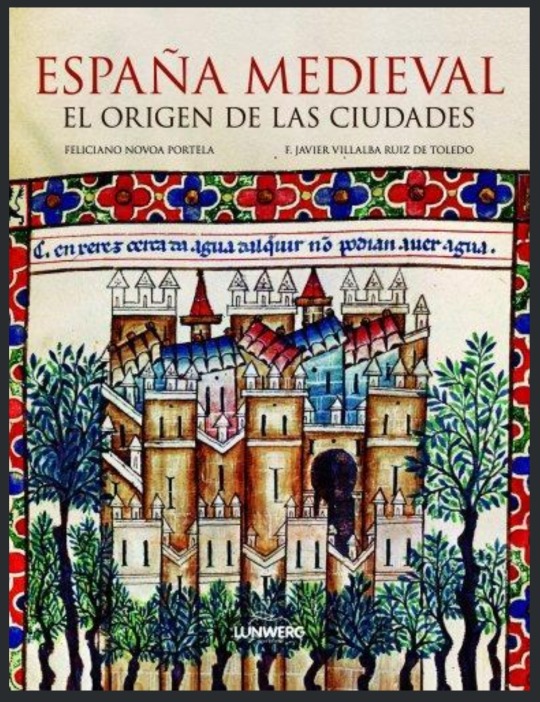

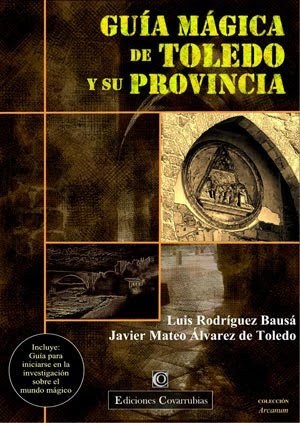
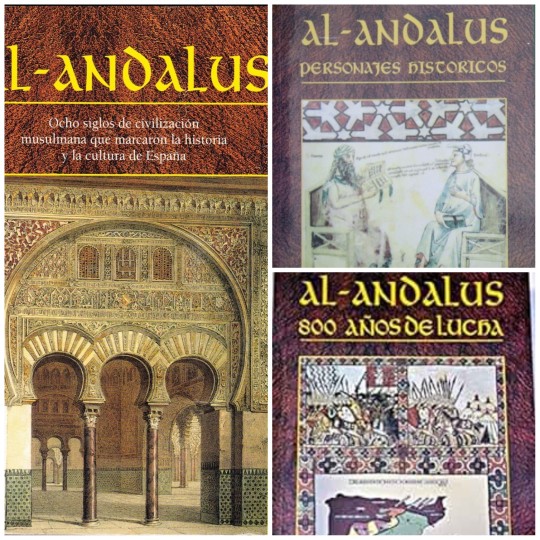

Propaganda
1. La Orden de Toledo: Paseos imaginarios en tiempos de vanguardia (The Order of Toledo: Imaginary walks in avant-garde times)
Author: Pantoja Rivero, Juan Carlos
Editorial: Covarrubias Ediciones
Edition: 2019
Synopsis: The Order of Toledo was, above all, an avant-garde fantasy of the brilliant film director Luis Buñuel, who knew how to infect his friends from the Generation of '27 to the Spanish intellectuality of the first third of the 20th century. Together, they dedicated themselves to living Toledo as if it were the great stage of a surrealist montage, in an artistic (or anti-artistic and irational) contrast with the monumentality and historical past of the old dead city.
(Well, in my blog I have been making posts about The Order of Toledo and the book is a valuable source)
2. Toledo: La ciudad de los muertos (Toledo: The city of the dead)
Author: Leblic García, Ventura
Editorial: Covarrubias Ediciones
Edition: 2013
Synopsis: Toledo. A large historical necropolis where Carpetans, Romans, Visigoths, Muslims, Jews and Christians rest...their rites around death, beliefs, customs, evolution of the cemetery spaces...
(I have posted the scans of the first pages of this books and I'm planning to keep on posting them but I wanted to know if you want scans from another book)
3. De Mayrit a Madrid: Madrid y los árabes del siglo IX al siglo XXI (From Mayrit to Madrid: Madrid and the Arabs from the 9th century to the 21st century)
Editors: Madrid. Casa Árabe e Instituto Internacional de Estudios Árabes y del Mundo Musulmán ; Barcelona ; Madrid: Lunwerg
Edition: 2011
Synopsis: This work deals with the Arab-Islamic past (Andalusian, Mudejar and Moorish) of Madrid and its forgotten heritage since it is the only European capital whose origins and name are linked to Arabic.
Revisiting that past and making it known is the objective of this work, which wants to rescue knowledge of a relationship between Madrid and the Arabs that does not end in the Middle Ages, since the town and court maintained various links with what was over time. Arab through diplomatic delegations, Arab figures welcomed by the city, valuable collections of manuscripts and numismatics, a romantic architectural taste that seeded the city with unique neo-Islamic buildings or Hispano-Arab scientific and cultural institutions. And, finally, the cosmopolitan and intercultural reconversion of the city has made it the recipient of a new Arab and Muslim immigration that once again gives human visibility to this relationship between Madrid and the Arab.
4. La Judería de Toledo (The Jewish Quarter of Toledo)
Author: Passini, Jean
Editorial: Ediciones del Sofer
Edition: 2014
Synopsis: The work reveals the vestiges of the areas of medieval Toledo Jewry and its history. It collects a topographical reading of its evolution and offers the main elements through maps, plans and high-quality color photographs.
5. Casas y casas principales urbanas : el espacio doméstico de Toledo a fines de la Edad Media (Houses and main urban houses: the domestic space of Toledo at the end of the Middle Ages)
Author: Passini, Jean.
Editor: Toledo. Universidad de Castilla-La Mancha
Edition: 2004
Synopsis: This work is an extension of previous research on different districts, and seeks, for the city as a whole, to “understand the genesis of medieval urban space, to follow its transformations and successive reappropriations” , mainly with the aim of understanding, for one of the ancient provincial capitals of al-Andalus, the modalities of the transition from the Muslim city of the end of the eleventh century (time of its occupation by the Christians) to the Castilian city of the end of the Middle Ages. The main documentary basis of the work is a very important and very detailed inventory of the real estate of the Cathedral Chapter, an inventory carried out in 1491-1492, which covers a considerable heritage of 557 various buildings located in 64 sites or districts. The identification and location of houses, shops, mesones or fondouks and other urban buildings, often difficult on the current plot, has however resulted in the careful study of more than half of these old buildings. The systematic comparison of the text from the end of the Middle Ages with the remains still visible above ground or underground (and this very meticulous and patient work in the cellars of current Toledan houses is one of the great originalities of the research of Jean Passini) gave the results which are presented in this latest publication.
6. España medieval : el origen de las ciudades (Medieval Spain: the origin of the cities)
Authors: Novoa Portela, Feliciano; Villalba Ruiz de Toledo, F. Javier
Editors: Barcelona ; Madrid : Lunwerg, D.L.
Edition: 2012
Synopsis: A fascinating essay that will teach us to look at and understand our cities better. In the pages of this essay we will analyze the Roman origins, the Islamic, Christian and European influences to discover the cultural melting pot that marks the Spanish urban legacy, without forgetting some disappeared cities that tell us their history through archaeological remains.
7. Valle-Inclán y el insólito caso del hombre con rayos x en los ojos
(Valle-Inclán and the unusual case of the man with x-rays in his eyes)
Editors: Madrid. La Felguera
Edition: 2014
Synopsis: In 1923, a piece of news sparked great controversy among intellectuals, journalists and scientists. Joaquín Argamasilla, a young descendant of a family of aristocrats, claimed to have x-ray vision that allowed him to see through opaque bodies. The controversy, which divided half the country between defenders and detractors of the strange case, reached the highest circles. In April, at the initiative of Queen María Cristina, a commission was established to study the case, chaired by Ramón y Cajal. Valle-Inclán came to Argamasilla's defense and the great Harry Houdini challenged him to a public demonstration in New York.
(Joaquín Argamasilla, Harry Houdini, Valle-Inclán, Ramón y Cajal... yep, we're thinking the same, episode 2xO6, Tiempo de Magia, from El Ministerio del Tiempo, if anyone wants to learn more about this topic this book is good)
8. Guía mágica de Toledo y su provincia (Magical guide to Toledo and its province)
Authors: Rodríguez Bausá, Luis; Álvarez de Toledo, Javier Mateo
Editorial: Ediciones Covarrubias
Edition: 2010
Synopsis: Saramago wrote that traveling should be a matter of another matter, staying more and walking less; and a little later he added that it is not good to stay for only a quarter of an hour next to a construction that is seven hundred years old. The authors agree with such appropriate phrases, and that is why they have written this route, this uneven guide, this compilation of events, in short, so that the traveler stops in a multitude of towns that only sounded like transit and never like stop and inn. Because the truth is that the city of Toledo and its province discreetly hide a large number of enclaves that deserve to be savored by the five senses, and in which one must rest until the memory is macerated. This is what this work talks about: caves, sacred mountains, magical wells, rainy images, enchanted fountains or thunderous miracles... but, above all, towns, cities and regions; yes, with order and a taste of dissidence and heterodoxy.
Also included is what the authors have called "Beginner's Guide", a brief but rigorous approach to the magical phenomenon, something like an index so that whoever wants it, has the basic premises to get started in the world of research on these issues.
9. AL-ANDALUS. Ocho siglos de civilización musulmana que marcaron la historia y la cultura de España (AL ANDALUS. Eight centuries of Muslim civilization that marked the history and culture of Spain)
Author: Masiá, Concha
Editorial: ALBA
Edition: 2006
Synopsis: "In the year 711, the Muslims arrived in the Iberian Peninsula. They called the vast territory where they settled for 800 years, from Tarifa to the Pyrenees, from the Levant to Portugal, al-Andalus. With their lights and shadows, these eight centuries of Muslim civilization, configuring many aspects of our personality as a people and as a culture, to which we Spaniards of the 21st century are still indebted"
This book and the following two books are like a triology about Al Andalus. This first one collects information about the different periods, states, events and some of its rulers throughout the history of Al Andalus.
10. AL-ANDALUS. Personajes históricos (AL ANDALUS. Historical figures)
Author: Masiá, Concha
Editorial: Albor Libros, Madrid
Edition: 2011
Synopsis: "A general vision of al-Andalus, from the 8th century to the 17th century, through its most prominent characters and also through less known, although no less important, people. Both of them reveal the splendor and glory of the imperishable Andalusian legacy"
This book gathers information about divers people from different states and periods throughout the history of Al Andalus: emirs, caliphs, politicians, religious leaders, warriors, scholars, artists, philosophers, poets...
11. AL-ANDALUS. 800 años de lucha (AL ANDALUS. 800 years of struggle)
Author: Masiá, Concha
Editorial: Albor Libros, Madrid
Edition: 2011
Synopsis: "In the year 711, the Muslims arrived in the Iberian Peninsula. They called the vast territory where they settled for 800 years, from Tarifa to the Pyrenees, from the Levant to Portugal, al-Andalus. With their lights and shadows, these eight centuries of Muslim civilization, configuring many aspects of our personality as a people and as a culture, to which we Spaniards of the 21st century are still indebted"
This book offers a view on the warfare, battles and military campaigns from different periods and states throughout the history of Al Andalus.
12. 20 grandes obras de 20 autores andalusíes (20 great works by 20 Andalusian authors)
Author: Lirola Delgado, Jorge
Editorial: FUNDACIÓN IBN TUFAYL DE ESTUDIOS ARABES
Edition: 2014
Synopsis: Selection of 20 Andalusian authors and 20 works from the different periods of al-Andalus. The book offers a biography of each author and a detailed description of the work.
#bookblr#books#history#polls#history books#spanish history#al andalus#la orden de toledo#paseos imaginarios en tiempos de vanguardia#toledo: la ciudad de los muertos#de mayrit a madrid#madrid y los árabes del siglo IX al siglo XXI#la judería de toledo#casas y casas principales urbanas#el espacio doméstico de Toledo a fines de la Edad Media#españa medieval : el origen de las ciudades#valle-inclán y el insólito caso del hombre con rayos x en los ojos#guía mágica de toledo y su provincia#AL-ANDALUS. Ocho siglos de civilización musulmana que marcaron la historia y la cultura de España#AL-ANDALUS. Personajes históricos#AL-ANDALUS. 800 años de lucha#20 grandes obras de 20 autores andalusíes#sefarad#madrid#toledo#the order of toledo#The Order of Toledo: Imaginary walks in avant-garde times#Toledo: The city of the dead#From Mayrit to Madrid#Madrid and the Arabs from the 9th century to the 21st century
9 notes
·
View notes
Text
By: Adam Neiblum
Published: Dec 20, 2023
Every once in a while, an atheist or other nonbeliever will undergo a change of heart. Someone who has self-identified as an atheist or, at the very least, a “none-of-the-above” type undergoes a change of mind. They may do a full turnabout and embrace a religious faith, either for the first time or as a return to the fold. For Ayaan Hirsi Ali, she began as a Muslim, turned atheist in her adulthood, and has recently rejected atheism to become a Christian, for the “legacy of the Judeo-Christian tradition.”
[For another perspective on Hirsi Ali’s conversion announcement, see Free Inquiry editor Paul Fidalgo’s “The Enemy of Her Enemy.”]
Confusingly, many of the world’s devout will argue that this individual conversion represents solid evidence that atheism is wrongheaded and that god belief and religious faith are right, good, and proper. Hirsi Ali makes this argument herself:
To me, this freedom of conscience and speech is perhaps the greatest benefit of Western civilization. It does not come naturally to man. It is the product of centuries of debate within Jewish and Christian communities. It was these debates that advanced science and reason, diminished cruelty, suppressed superstitions, and built institutions to order and protect life, while guaranteeing freedom to as many people as possible. Unlike Islam, Christianity outgrew its dogmatic stage. It became increasingly clear that Christ’s teaching implied not only a circumscribed role for religion as something separate from politics. It also implied compassion for the sinner and humility for the believer.
Hirsi Ali and I have very different understandings of the history and impact of Christianity on Euro-American culture. Is she not aware of Christian misogyny? Or the importance of America’s separation of church and state? How about the 165-year-long denial of our true origin story: Charles Darwin and the theory of evolution? Or contemporary bans on knowledge and literacy? And why are atheists still considered by so many Americans to be misguided at best or literally demonic at worst? From where I sit, Christianity impedes our progress and development toward a more enlightened, peaceful, and sustainable human civilization. The fact that this one individual chose to embrace religion is understood to be strong evidence supporting the conclusion that atheism is a mistake, a transgression; that atheists such as myself have been shown the error of our ways and put in our place.
I would like to set the record straight.
Just the Facts
Many readers are no doubt familiar with the God-of-the-gaps concept. This refers to the fact that, historically, answers to life’s many mysteries that had been religious or spiritual in nature—God caused that tsunami or this hurricane, for example—are replaced with the falsifiable and far more probable answers on offer from reason and science. Importantly, however, this well-known phenomenon rarely, if ever, goes in reverse: from the scientific and rational back to the spiritual and religious, except perhaps in the minds of the religiously inclined (think flat-earthers).
And so it is in regard to these nonbelievers who embrace, or return to, religious faith and supernatural beliefs. It happens, but it happens very rarely. When it does happen, it makes a splash. True believers make a big deal about it. If it is someone well-known, it may even make the evening news.
When I finally awakened to the fact that god beliefs are entirely false—the result of cognitive instincts in conjunction with powerful cultural indoctrination—and recognized the truth behind atheism, it was a moment of genuine awakening. I could never go backward into darkness. It’s the same with belief in Santa Claus. Once you grow up and “get it,” it is extremely unlikely that a sane adult is ever going to return to a genuine belief in Santa Claus.
Furthermore, individuals turning away from religion and turning toward the light of reason is not at all extraordinary but, in fact, an everyday occurrence. Here in the United States, it has been happening for years. Those who return to religion are few and far between, whereas, according to Pew Research, the United States is undergoing a “rise of the nones,” with Americans turning away from religious affiliation in droves.
So, these individual conversions (or re-conversions, as the case may be) do occur. But they are far rarer than, and unevenly trumpeted, is generally recognized. This singular example of conversion is thought to serve as evidence that we atheists are delusional lost souls on the wrong track. The devout will often crow, in a somewhat accusatory, “gotcha” manner, What do you infidels make of THAT?
Deathbed Conversion
In December 2011, famous atheist and contrarian Christopher Hitchens, author of God is Not Great: How Religion Poisons Everything, breathed his last, ceased to be, and shufflel’d off this mortal coil. Unsurprisingly, rumors quickly circulated that he had undergone a “deathbed conversion” to Christianity. This merely represented an example of Christianity’s fast and loose relationship with the truth, his son confirming that nothing of the sort happened. It proved to be just another of the relentless fictions and fables that are the beating heart of religious faith and god beliefs. More propaganda.

[ Christopher Hitchens by RantingJo ]
But even when a deathbed conversion does occur, it in no way, shape, or form suggests that atheists are in error or misguided. When driven by fear, terror, and worry, when face to face with death, be it the “atheist in the foxhole” or the similarly iconic deathbed conversion trope, it comes as no surprise if some, on occasion, return to religious belief for consolation or are inclined to make other, similarly poor decisions. None of this says anything about whether God is real, nor whether any religious claims are true or even remotely beneficial. Deathbed and foxhole conversions are far fewer in number than we are led to believe by such deeply enmeshed axiomatic truisms. If and when they do occur, all they really tell us is that when faced with existential fears, we humans can be strongly inclined to weakness of will, a propensity to choose instinct over reason or comforting fictions over hard facts. And they tell us that religious indoctrination is very, very effective.
Hitchens had, like myself, a solid secular education and had clearly demonstrated that he was more than comfortable with the reality so many fear to face. Simply put, when we die, we simply cease to exist, except through our works, our friends’ and family’s (hopefully) fond remembrances, and the prodigious supply of food we represent for the worms, tiny organisms, and microbiota so essential to life on planet Earth.
An Extraordinary Case
All this brings me to the hot topic at hand—Ayaan Hirsi Ali, famous Muslim-turned-atheist, author of Infidel (2006), Nomad (2010), and Heretic (2015). Hirsi Ali was raised, and heavily indoctrinated, in the deeply misogynistic Islam of modern Somalia. She suffered horrid abuse, including female genital mutilation (FGM), at the hands of the Muslim devout. Once she escaped from this early influence, she became an avid atheist, a politicized activist, an advocate for women’s rights, and an outspoken critic of the religion of Islam, especially in regard to forced marriage, honor killings, child marriage, and the practice of FGM.
In my own work, I have made several references to Hirsi Ali. I stand by my comments at the time and in my writing. Her story, as told in Infidel, serves as an excellent example of the highly problematic nature of Abrahamic faith, the backward nature of some branches in particular, and the significant and entirely positive changes wrought by awakening to atheism.
Hirsi Ali has now returned to the Abrahamic fold, converting to Christianity. This has been presented to some of us more outspoken atheists as if it were a repudiation of our work, our beliefs, and our very lives as nonbelievers. But that Hirsi Ali should return to this somewhat less misogynistic branch of the Abrahamic faiths comes as no big surprise to this atheist. She has simply found solace in an Abrahamic sect that offers her the comfort and familiarity of a childhood characterized by extremely powerful indoctrination and yet without the heinous degree of misogyny with which her own life was so violently rent. I imagine it might feel very comfortable for her.
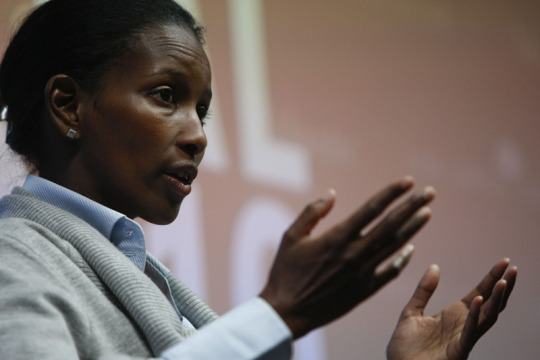
Hirsi Ali is misguided to believe as she does. Let me be clear: I am never critical of the believer, only the belief. It is clear to me that the Abrahamic religions of Christianity and Islam are highly problematic, being both factually fallacious and ethically errant. My stance is that believers are genuinely misguided. I have nothing against believers, however. I oppose the beliefs, not the persons who are themselves the victims of those beliefs.
But Hirsi Ali has an agenda. It just happens to be one that I, and I am confident many of my fellow Nones, can agree with. She is a feminist who strongly opposes what many branches and sects of Islam do to women and girls. She believes that Christianity offers the best way out of these specific worldly troubles. And indeed, to a certain limited degree, it is possible she is correct. Euro-American Christianity today is, broadly speaking, far less misogynistic than either today’s Islam or yesterday’s Christianity. While some sub-Saharan and South American Christianity still remains stuck in the eighteenth century, the Islamic practices she challenges are positively biblical, so to speak. If her goal is to communicate an anti-misogynist message to the largest proportion of modern humans she possibly can, she will probably reach more as a feminist Christian than as an atheist. As she stated in her article regarding her conversion to Christianity:
[W]e can’t fight off these formidable forces unless we can answer the question: what is it that unites us? The response that ‘God is dead!’ seems insufficient. So, too, does the attempt to find solace in ‘the rules-based liberal international order.’ The only credible answer, I believe, lies in our desire to uphold the legacy of the Judeo-Christian tradition.”
I can’t help but wonder if in fact Hirsi Ali was ever truly an atheist in the first place.
Wrong and Bad
Hirsi Ali and I obviously have a very different view of the “legacy of the Judeo-Christian tradition.” The position that many, including myself and (I dare say) the late Mr. Hitchens, wholeheartedly assert and avow, is that the Abrahamic religions of Islam and Christianity are, as a matter of fact, both wrong and bad. They are wrong in the sense that they represent pseudoscience dangerously misinterpreted as literal truth by millions. They are bad because they cause more problems than they cure in the big picture, in the long run, and promote a stunted moralism that is more obedience training than genuine moral good.
Ideally, her atheism should not have had anything to do with her fight against misogynistic practices. The fact that she felt compelled to rejoin religion to keep the focus on the important issue of women’s and girls’ rights is most unfortunate. In the end, though, only Hirsi Ali knows whether she made this choice to maximize her reach as a feminist activist or because she personally suffered from what most who re-convert, be it in foxholes or upon deathbeds, also suffer from—a childhood and lifetime of intense indoctrination in the Abrahamic religions.
To fully understand the re-conversion of Ayaan Hirsi Ali, then, three things should be taken into account. First, it is possible that she wisely calculated that conversion to Christianity, still the world’s largest religion, offered her the best possible opportunity to make inroads on behalf of feminism and women’s rights. Unfortunate, because she could have probably done her work and kept the focus off of her religious beliefs or lack thereof. The second point would be that she was heavily indoctrinated, deeply and fully, in the Abrahamic religious beliefs and practices. As such, she has perhaps returned to her comfort zone of consoling beliefs. As she stated, “I have also turned to Christianity because I ultimately found life without any spiritual solace unendurable—indeed very nearly self-destructive. Atheism failed to answer a simple question: what is the meaning and purpose of life?” And yet, at the same time, she gets to keep up a good fight. A lifetime of hard-core indoctrination is extremely difficult to overcome. All the re-conversion of Hirsi Ali really tells us is that religious indoctrination is a very powerful thing.
But, we already knew that.
Ultimately, I think that Hirsi Ali is misguided. Atheism is true and right, and religions such as Christianity and Islam are both wrong and bad. So don’t look to us atheists as if her re-conversion somehow showed we were wrong all along. It shows nothing of the kind. It may show that atheists are not accorded the respect we should be, such that we cannot advocate for genuine, valid causes as successfully as we ought to be able to, because people tend to dismiss us outright and without reason. It illustrates the intense power of religious indoctrination and shows us just how seriously difficult it is to overcome.
I think that the real take-home message is that we should more seriously embrace atheism and freedom from religion. That she required submission to mother church and Christian dogma to find a sense of purpose and meaning does not mean that we require religion to have such things. She felt them missing precisely because religious propaganda had impressed upon her, fallaciously, that the two are inseparable. But my life, and the lives of the many atheists I know, have purpose and meaning. However, they are the result of reason, naturalistic knowledge, and science, not faith, submission to authority, dogma, or traditions that are literal millennia beyond their expiration date. Religion disempowers human beings and human civilization. It is through atheism and humanism that we Homo sapiens will be empowered, employing reason and knowledge to build a more just, peaceful, and sustainable human civilization here on this beautiful planet Earth, upon which we evolved into existence.
#Adam Neiblum#Ayaan Hirsi Ali#Christopher Hitchens#deathbed conversion#atheism#christianity#islam#abrahamism#abrahamic religions#religion is a mental illness
6 notes
·
View notes
Note
i wanna help palestine, however i don't have much money to send for help. besides reposting links, and trying to spread the truth, what else can be done? i don't want my lack of funds to be a reason innocence suffers.
https://arab.org/click-to-help/palestine/ - click daily for free and the proceeds will go to charity.
Save media (videos and images) - social media has taken down so many pages over the years (Eye on Palestine is now up on Instagram but they were down for a few days and unsure if they'd be back) so for those with a solid external harddrive, do your thing!
I know you said this but keep sharing posts! The same as above, many websites want to censor Palestinian content. Share as much as you can to combat the propaganda news outlets are spreading. FOLLOW AS MANY PALESTINIAN ACTIVISTS AS YOU CAN!
Protests - attend a protest if you can! Remember to mask up (for virus and personal security purposes) and hide any identifiable markings like tattoos. There are many how-to-protest guides out there with important information on what to bring so please read up on those before attending!
Contact your reps - Link for Europeans. Link for Americans. Google Doc with scripts for different countries!
Involved money but I'm adding it for the folks with funds!
bdsmovement - The South African boycott was fundamental so I don't want to hear anyone saying boycotting doesn't work. From my knowledge the bdsmovement is the main boycotting list, it systematically boycotts companies to give the biggest impact but I've also been avoiding Mcdonald's, Burger King, Starbucks, Disney (is generally a bullshit company otherwise), and Apple (is also a bullshit company otherwise too) for the what they've been doing in Israel too and many others have too because their sales have fallen.
Support Palestinian Businesses - seen posts around that loads of people are ordering and preordering from kufiya.org/ which are the last remaining Kufiya makers.
I'll update this with more information/links when found!
I hope this makes sense I just woke up but I needed to answer this.
7 notes
·
View notes
Text
After a weekend of intense United States airstrikes against its proxies in Iraq, Syria, and Yemen, Iran has issued a harsh warning not to target a ship that U.S. officials and analysts suspect of providing real-time intelligence for attacks on other vessels in the Red Sea. The ship is also allegedly serving as a forward operating base for its militants.
In a video published on the Iranian army’s Telegram channel Sunday, a narrator says in English that “those engaging in terrorist activities against the MV Behshad or similar vessels, jeopardize international maritime routes, and security and assume global responsibility for potential future international risks.” The video further claims that the Behshad as a “floating armory.” The narrator says it is involved in missions to “counteract piracy in the Red Sea and the Gulf of Aden,” although Iran is not publicly known to have taken part in any recent anti-piracy campaigns in the region, according to a report by NBC News.
When asked by NBC News about the ship Monday, Defense Department press secretary Major General Patrick Ryder said, “I am not aware of the U.S. targeting the Behshad. We are very well aware of the ship.”
The Behshad is registered as a commercial cargo ship with a Tehran-based company that the U.S. Treasury has sanctioned as allegedly being a front for the state-run Islamic Republic of Iran Shipping Lines.
The Iranian ship provides electronic intelligence to the Houthis, enabling them to spot and target vessels in the Red Sea region, according to a U.S. official, a U.S. congressional aide with knowledge of the matter and a Middle Eastern official. –NBC News
Houthi Rebels Continue Attacks In Red Sea
“It’s a sort of open secret within government circles that this ship is causing us quite significant problems,” said Charles Lister, a senior fellow at the Middle East Institute, a Washington-based think tank. “Wherever the Behshad goes happens to be more or less where the Houthis happen to be targeting their anti-ship ballistic missiles, suicide drones, and suicide boats,” he added.
This ship could also play a vital role in a retaliatory response against the U.S. for it’s strikes over the weekend.
4 notes
·
View notes